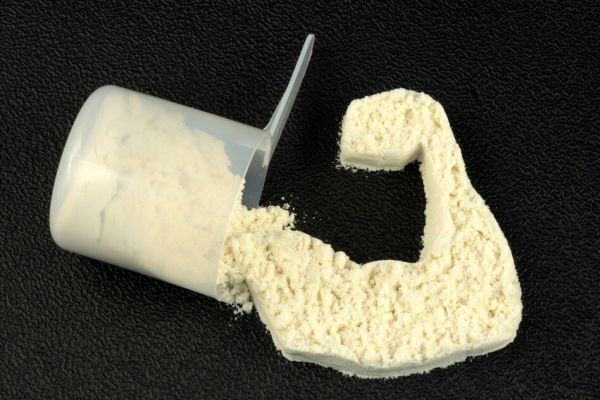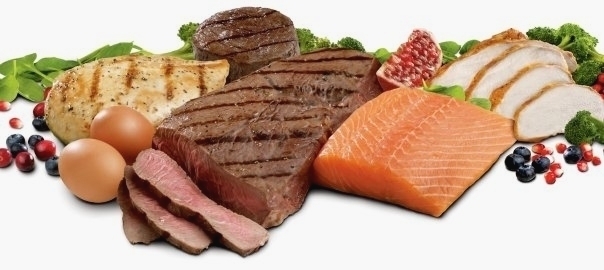
Protein powders are a necessary supplement for your bodybuilding needs or any kind of muscle-building activity.
Protein builds, maintains, and recovers the body. It comes from the Greek word protos which means “first, most important”.
The needed intake is from 1-2.5 grams of protein per kilogram of body weight depending on multiple factors. This pertains to a protein from almost any source. But to consume 140 grams of protein from meat only, you’ll need to eat 560 grams of meat. Protein shakes make it easier to achieve your daily protein intake. And more than just this.
When and how much to take?
Protein powders as a supplement are taken when you know you need them. Recommendations about taking it before or after a workout or in the morning… are too general. People do a mistake with protein shakes, for example, they take a shake after a workout as a meal and they think they are fed. That is a catastrophic mistake for the hormonal system.
The main role of protein powders is not to replace a meal but to enrich it. One of the smartest uses of protein powders as a supplement is to use them in healthy recipes. Proteins help achieve ideal composition in sweet but not unhealthy pleasures.
The point is during the day you need to have the needed amount of protein as well as the needed amount of fats.
Too high an intake of proteins can also increase insulin and start turning protein into blood sugar, which can lead to weight gain.
We don’t recommend drinking a protein shake on an empty stomach without adding fats/oils. Pure protein shakes can additionally spike insulin and thus lower fat burning for energy.
Along with proper training, nutrition, and enough sleep, the body is capable to use a maximum of your protein intake for maximum muscle growth.
If for example, you don’t sleep enough, the effect of protein intake will be significantly reduced. Or if you don’t cause enough stress to your muscles and on the whole body, the effect will also be significantly lowered. Taking too much carbs will lower the growth hormone, which is the key to using protein as the raw material for muscle growth.
If you get too much carbohydrates, it will reduce the release of the hormone glucagon (together with HGH) which are responsible for burning the excess body fat and the use of fats for energy. Read what triggers glucagon release and how proteins are key to its release.
Increased body fat will cause an increase in estrogen which directly lowers testosterone. Again, we have lower use of proteins. Proteins help burn excess body fat but only under certain circumstances.
Within our programs, you get recommendations and instructions on your daily macronutrient intake.
Some types of protein powders
Muskultura recommends Keto Kultura’s whey protein powder.
As a supplement, there are more types of protein powders.
Whey protein
Whey is a liquid that remains in the process of cheese production. Milk is heated and added a thickening substance. After the milk starts to thicken, there remains a watery substance – whey. Protein manufacturers filter it and dry it with hot and cold air to obtain a dry substance from it.
- This dry substance is protein concentrate. It contains about 80% pure whey protein and the rest is carbs (milk sugar) and fats.
- If they subject it to an additional process with which the greater part of carbs and fats are taken out, we get a protein isolate. Whey protein isolate is 90% pure protein.
- When protein can be processed in another way by separating the protein molecules. The derived protein is called hydrolyzed protein and contains 90-95% pure protein. Manufacturers claim this makes it even easier to absorb, although whey protein by itself is very easily digested thus the difference being negligible but the effect on sales isn’t. Nevertheless, this form of protein has a much stronger effect on insulin causing it to spike high. (Therefore oils.)
Always read the nutrition facts labels and look over how much carbs it contains in 100 gr or a single dose. Take into account the carbs from your protein doses together with your carbohydrate intake for the whole day. Proteins with artificial sweeteners and additives also negatively influence hormones and many of those additives spike insulin. Thus taste should not be a criterium, at all.
Casein protein
Milk contains two types of protein. Whey protein (20%) and casein (80%). As described above, when the milk thickens as a result of the process it’s subjected to, the whey and casein proteins are separated. The whey protein remains in the watery substance, and casein remains in the lumps (called curds).
Casein protein absorbs about 40% slower than whey protein and causes less insulin release than whey protein.
Casein is usually more expensive than whey protein. Some casein proteins contain 10 grams of milk sugar on 100 grams of powder. Some contain 3 grams. Of course, choose the one with less sugar but take into account also the additional ingredients.
Beef protein
Depending on the product, the question is “Is it intended for training or beauty salon?”
[Read: Beef protein: collagen or meat?]
Soy protein
We don’t recommend soy proteins at all, nor products that contain soy protein as part of their protein content. Here’s why.
To achieve maximum use of proteins to build muscle mass, these principles need to be followed:









